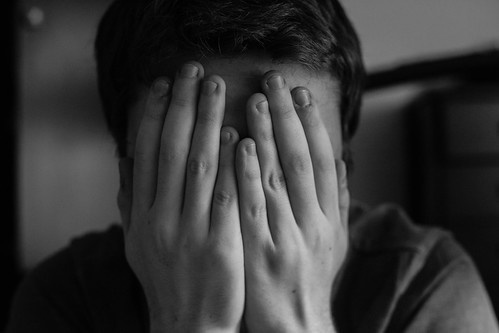When You Have Postpartum Depression but Didn’t Give Birth
There is a lot of attention paid, in society and the media, to women who experience postpartum mood disorders. Research is done, peer support groups are formed, and health initiatives are launched. But very little attention has, historically, been paid to partners. Did you know that is was possible for partners to experience a postpartum mood disorder like depression or anxiety? If you search “spouse postpartum depression” you get dozens of pages dedicated to supporting your partner, but nothing if you are the one suffering. The results are better if you search “men postpartum depression” (which is limiting in and of itself).
When you do find sources, they tend to be out of date, but the information they contain is concerning. They suggest that 1 in 8 partners with new babies experience postpartum depression. And in partners with PPD, the impact on the child could be seen in the acquired vocabulary at 24 months. This is likely due to similar findings in cases of maternal mood disorders; the parent is unable to interact as much with the child, resulting in less language.
Depression in men is often sparked by different causes than maternal depression. There is less hormonal impact, but life changes are huge. Some men wonder if their partner will still be interested in them, and perceive her (completely normal) lack of interest in sex as rejection of *them*. Others worry about being the provider; after all, raising a child is expensive. Then there are causes that are the same for everyone, crying babies and sleepless nights can have an impact on everyone. Depression may not always look the same in partners either. Some signs to watch for are irritability, even to the point of hostility, or they may become withdrawn. They may also engage in self-destructive behaviours like drinking too much, or working longer hours than they did before the baby.
Just as we encourage women who have given birth to seek help if they are experiencing a postpartum mood disorder, we recommend that partners do the same. Depression is not a failure or inadequacy, it is an illness and we should treat it as such. If you had strep throat or broke your leg, you wouldn’t shake it off, you would go to your doctor. The same applies to mood disorders. Below is an interview with a local partner who experience postpartum depression after the birth of their child. You are not alone.
What was the hardest thing about becoming a dad?
For me, the hardest thing about becoming a father was the fact that I hadn’t intended to be one to begin with. Once I came to terms with the reality of my situation, things got somewhat easier, but that initial hurdle was difficult to surmount.
How do you think other people perceived you as a father?
My friends and family tell me I’m doing a good job. I think fathers (especially single fathers) as a general rule are still burdened by that late 90s sitcom perception of the doddering dullard father figure (think Homer Simpson) who needs to be kept well in hand by his capable, nearly superhuman wife. I regularly hear from passersby about how nice it is that I’m “babysitting” my son, or “giving mom a break”. It can be galling after a while.
What challenges did you encounter when you took your child out in public?
The idea that I’m somehow not in the parenting role, or that I’m “taking over” for mom, can be extremely tiresome. I’ve often been asked where his mother is or what I’ve done to be forced to take on this primary role. It’s bizarre.
Who was the stay at home parent?
I was, for the first year. My partner went back to work six months after my son was born, so for eight or so months after that I was the stay-at-home parent.
How did that affect you?
It was extremely challenging. Thanks to our geographic location, I felt extremely isolated. I am very, very grateful for the bonding time with my son, but it was really hard to navigate as my entire identity was sublimated into “dad”.
Did you realize you were depressed at the time?
No, not really. I’ve always struggled with depression and substance abuse, and I don’t think I realized that I was pouring my scotches a little deeper once Mom got home and the little guy was put to bed. I can recognize the signs now, with retrospection, but at the time I thought, “this is just what parenthood is – suck it up”. That’s what men are told. Mothers are given a great deal of support and leeway, while fathers aren’t. That’s kind of just how the culture is organized.
Do you think partners face stigma in dealing with postpartum mood disorders, since they didn’t give birth?
Yes. In my case I can speak only for men, but the idea that a man could be depressed after the birth of a child is seen as a failing on the man’s part. I know PPD is still not widely understood and that women face stigma as well, but the mere idea that a man could have feelings about the birth of his child is still looked at as ludicrous in some way – as a bizarre deviation from the norm. I think we need to talk more about the father’s role in childbirth in order to fight this frustrating and ultimately damaging cultural understanding.
Photo by Ryan Melaugh. Shared under Creative Commons Licensing.

